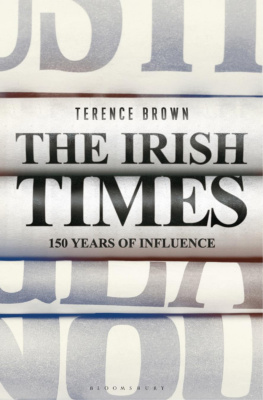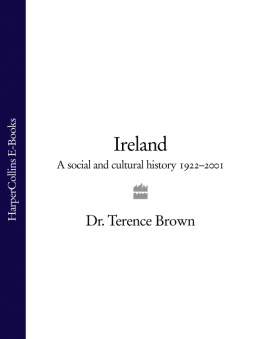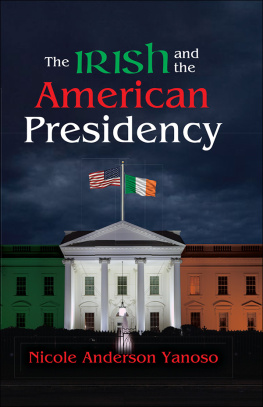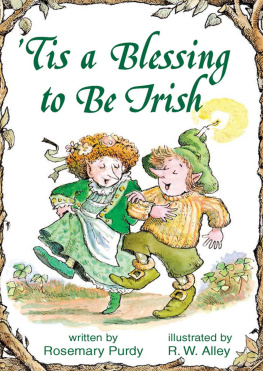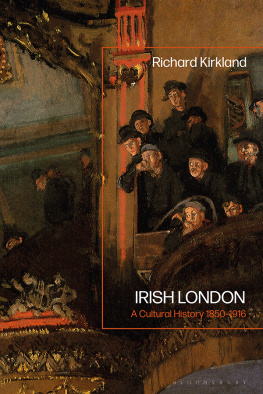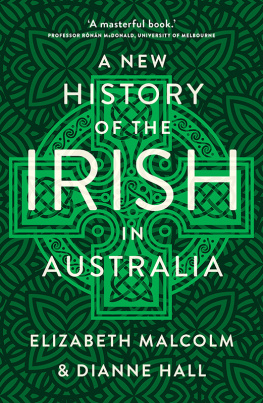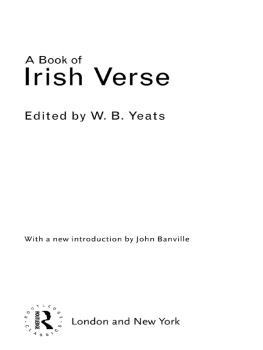THE IRISH TIMES
T HE I RISH T IMES
150 Years of Influence
Terence Brown

Bloomsbury Continuum
An imprint of Bloomsbury Publishing Plc
50 Bedford Square | 1385 Broadway |
London | New York |
WC1B 3DP | NY 10018 |
UK | USA |
www.bloomsbury.com
Bloomsbury, Continuum and the Diana logo are trademarks of Bloomsbury Publishing Plc
First published 2015
Terence Brown, 2015
Terence Brown has asserted his right under the Copyright, Designs and Patents Act, 1988, to be identified as Author of this work.
All rights reserved. No part of this publication may be reproduced or transmitted in any form or by any means, electronic or mechanical, including photocopying, recording, or any information storage or retrieval system, without prior permission in writing from the publishers.
No responsibility for loss caused to any individual or organization acting on or refraining from action as a result of the material in this publication can be accepted by Bloomsbury or the author.
British Library Cataloguing-in-Publication Data
A catalogue record for this book is available from the British Library.
Library of Congress Cataloguing-in-Publication data has been applied for.
ISBN HB: 9781472919069
ISBN ePDF: 9781472919083
ISBN ePub: 9781472919076
2 4 6 8 10 9 7 5 3 1
Typeset by seagulls.net
To find out more about our authors and books visit www.bloomsbury.com. Here you will find extracts, author interviews, details of forthcoming events and the option to sign up for our newsletters.
In memory of my father
Henry Montgomery Brown
Journalist, Missionary, Preacher
FIRST PLATE SECTION
SECOND PLATE SECTION
I n April 2007 I was approached by the then Chairman of the Irish Times Trust, Professor David McConnell, asking for advice. He explained that the newspaper would celebrate its 150th birthday in 2009 and that the Trust was keen that a history of the Irish Times might be written to mark the role it had played in Irish life since 1859. He wondered if I could suggest the name of anyone who might be invited to undertake such a task. When we met again a week or so later, he surprised me greatly by asking, on behalf of the Trust, whether I myself might be willing to accept such an invitation. I informed David (whom I have known since our student days in Trinity College Dublin in the 1960s, when I first began to read the newspaper on a daily basis) that I would give the matter serious thought. Having discussed McConnells proposal in detail with my literary agent, Jonathan Williams, by the autumn of 2007 I had reached an agreement with the Irish Times that I would write a book on the history of the newspaper. In striking this agreement, I made it clear that it would take until much later than 2009 to complete such a work and that the book I envisaged writing would not be a conventional institutional history with a primary focus on such things as its finances, business affairs and administration. Rather, it would have as the papers main concern the analysis of how the newspaper had reported and reflected on Ireland and the world over the course of the 150 turbulent years since 1859 when the Irish Times was founded.
In agreeing with pleasure to undertake this task, I was emboldened by two things. First, I was aware that in September 2009 I could take early retirement from my Chair in Trinity College, so before long I would have time to write a book of the length necessary. Secondly, in 2004 I had published a revised version of my book of 1981, Ireland: A Social and Cultural History 19221979. This had involved doing research on the countrys recent past, 19792002, which I believed would prove useful when I came to write about the Irish Times of the 1980s and 1990s. I was aware, too, that David McConnell had been prompted by my Ireland to consider extending to me the invitation he had done, since it covered an important period in the newspapers history and this fitted me for the kind of work he thought I might agree to attempt.
Accordingly, this book is the product of the first years of my retirement and I hope it justifies the hopes Professor McConnell and the Trust placed in me. While I was working on and writing the book, The Irish Times Ltd afforded me some financial support, though it is important to state that this book is independent of the newspaper and is in no sense an official publication.
In writing this book I was aided by other authors who have broached the topic. I am thinking especially of Mark OBriens conscientious The Irish Times: A History, to which I am significantly indebted (as citations in this book indicate). John Martins contentious The Irish Times: Past and Present, kept me alert to the role of ideology in the papers attitudes, while the theme of Dermot Jamess From the Margins to the Centre: A History of the Irish Times helped me to shape the narrative I wished to present in my book. For Jamess book presents the history of the paper as one which inscribes how an organ of a peripheral caste, the Protestant Anglo-Irish, became adapted to the emergent Irish nation and eventually central to its life. By contrast, as I read the nineteenth-century newspaper I became increasingly aware how, as the voice of imperial Unionism in the period, the newspaper felt itself as basically secure in its Tory patriotism in a Victorian world, and so at the centre of things. Its experience in the twentieth century, examined in detail in the main body of this book, was that of a challenging modernity, in which the Victorian frame of mind experienced repeated assaults in a time of science, new technologies and social forces, world wars, the claims of nation states, of economic crises, political extremisms and political violence. The adaptation of the newspaper this book traces is to modernity itself, in the context of an island nation within the European Union trading in the globalized economy of the late twentieth and early twenty-first centuries.
In writing this book I accrued various debts. I am grateful to Liam Kavanagh of the Irish Times, who arranged access for me to the newspapers digital archive. Searchable electronic resources of this kind have made newspapers available to researchers in exciting new ways and this book is I hope evidence of that. I am also grateful to Professor David McConnell for introducing me to the late Major Thomas McDowell. Over dinner in the latters home I had the valuable opportunity to gain an impression of his character and personality. Geraldine Kennedy kindly allowed me to listen to a recording of an excellent interview she had conducted with Major McDowell. John Horgan supplied me with a very interesting written account of the early phase of his career with the Irish Times. Conversations with him were helpful, indeed, as they were with James Downey, with Ambassador to Finland, Dnal Denham (whose father was an employee of the newspaper) and with Gerry Smyth.
I am grateful, too, for Jonathan Williamss constant encouragement, for his faith in the book, and for the loyal support of my wife Suzanne, who patiently endured my obsession with an engrossing, time-consuming project.
Terence Brown
Dublin, 18 September 2014
I n 1869 Anthony Trollope, that eminent Victorian, published what many consider to be his masterwork, He Knew He Was Right. A grim tale of marital discord and insane jealousy that imagines an obsession of Othello-like intensity in a world of telegraphs and anger, the novel, in many of its details, reflects the fact that it was the product of an information and communications age. In a world of almost instantaneous postal delivery and journeys by train, the author, in frequent topical references, assumes that he is writing for an informed audience, one that will have been reading newspaper discussions of the implications of the Reform Act of 1867. That journalism is a fact of the modern life the novelist evokes throughout his book is made clear inasmuch as a main character in one of its subsidiary plot-lines is a young man attempting to carve out a position for himself as a member of the Victorian fourth estate. Trollope, as always in his fiction, is alert to the social and economic aspects of his characters aspirations.
Next page
